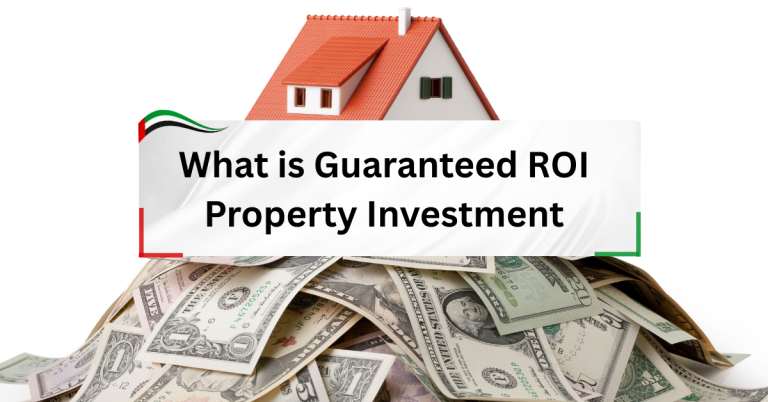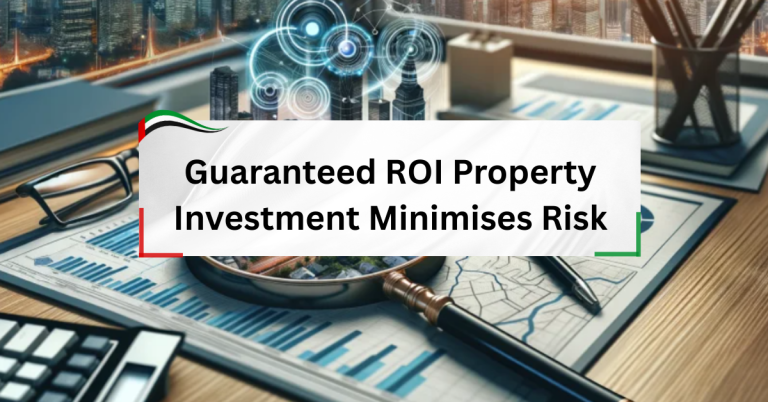How Developers Offer Guaranteed ROI in Real Estate Projects
- How Developers Offer Guaranteed ROI in Real Estate Projects
- Developers' Role in Real Estate ROI
- Mechanisms for Developers to Guarantee ROI
- Advantages of Guaranteed ROI for Investors
- Advantages of Guaranteed ROI for Developers
- Risks and Limitations of Guaranteed ROI in Real Estate Models
- Legal Aspects of Guaranteed ROI in Real Estate
- Conclusion
- FAQs About Guaranteed ROI in Real Estate
How Developers Offer Guaranteed ROI in Real Estate Projects
From a very point of view, the present investment scenario in real estate has begun looking very unsatisfactory for a category of investors who only want return security on their investments from owning a property. The idea is of guaranteed ROI (Return on Investment), in this model, market fluctuations become irrelevant for the giving out of fixed returns by developers to investors, usually in the form of rental income or capital appreciation, for a certain period. The concept, thereby, gives a lot of assurance and peace of mind to many investors, especially the newer entrants into the market.
Developers’ Role in Real Estate ROI
Developers play a critical role in shaping the structure of guaranteed ROI deals. They act not just as builders but as investment managers, ensuring that investors get returns while properties remain profitable.
How Developers Structure Investment Deals
Developers typically structure ROI deals through:
Rental guarantees are included in the sale agreement, promising a specified fixed rental yield.
Pre-arranging tenants to enable continuous cash flows.
Offering buyback options whereby an agreement allows the developer to purchase back the property at an agreed-upon figure.
The structure makes real-estate investments much closer to fixed-income financial instruments, thereby appealing to risk-averse investors.
Mechanisms for Developers to Guarantee ROI
There are various methodologies for offering guaranteed ROI. Developers have creatively come in with several models enabling investors to feel quite safe regarding returns on investment.
Buyback Schemes and Rental Guarantees
Among the most common methods, rental guarantees work under the promise of payment for a fixed rental income over a set number of years. Buyback schemes have a similar character, meaning that investors exit at their desire by selling back the property to the developer at a fixed price, thus counteracting losses.
Pre-Leased Property Models
In this model, developers sell properties that are already occupied by tenants. Investors start earning rental income right from day one, with how these properties operate, thus minimising the risks of vacancy. These pre-leased properties generally enjoy the presence of corporate tenants, adding credence and stability to the investment.
Revenue Sharing Agreements
Some developers, particularly in commercial projects like malls or co-working spaces, opt for a revenue-sharing model rather than a fixed payment. Investors receive a percentage of the revenue generated by the tenants. It ensures greater transparency on both risks and returns.
Advantages of Guaranteed ROI for Investors
Guaranteed ROI models are designed to attract investors, but what do they actually offer in return?
An Investor Has Reduced Investment Risks
Investment in real estate involves risks such as market slowdowns, rental vacancies, and delayed appreciation. As such, guaranteed ROI absorbs all risks imposed by the developer, thereby releasing the investor to simply enjoy the benefits without worrying.
Securing Passive Income Streams
Managing property from a distance, especially by investors who are NRIs (Non-Resident Indians) or international buyers, can be a serious headache. The assured return allows them a smooth, uninterrupted income while managing no tenants, maintenance, or anything that requires property management.
Welcoming First Tiers and International Investors
Guaranteed ROI schemes have been notably useful in luring new investors into the market. First-timers feel reassured, while international investors perceive it as a safe option when compared to the fluctuating real estate market of their home countries. This widens the basis of investors and makes real estate a more approachable asset class.
Advantages of Guaranteed ROI for Developers
Guaranteed ROI is attractive for investors because it provides them with safety and predictability of returns. Similarly, this pays huge dividends for developers in several ways.
Accelerating Sales Velocity
The most pressing problem on the table for developers is the need for quick turnover of inventory. When guaranteed ROI is offered, it speeds up the sales process, which offers a clean financial incentive to investors. This helps fund projects faster and reduces dependency on bank loans for developers.
Building Investor Trust and Long-Term Relations
Developers who have successfully delivered guaranteed returns have earned the trust and credibility in the market. This leads to sustained long-term investor relations and will bring back investors to participate in future projects.
Differentiating in Competitive Sectors
On the competitive battlefield of real estate markets, guaranteed returns on investments stand out as a unique selling proposition (USP). It dots the path where developers open up and attract earnest investors, even when the market appears dull.
Risks and Limitations of Guaranteed ROI in Real Estate Models
While guaranteed ROI sounds promising, it is not suspended in a vacuum. Both investors and developers must weigh the limitations to avert disillusionment and disputes.
Unrealistic ROIs are Promised
One of the major red flags in a guaranteed ROI project is a developer promising astronomically high returns, say 15-20% a year, without any real financial model backing them. Most markets give rental yields of between 4% and 10%. Anything above that often raises questions and is a red flag for a possibly unsustainable scheme. Investors must beware of such promises aimed only to sucker in buyers in the short term.
Dependence on Market Cycles
Fulfilling an ROI promise is mainly dependent on market conditions. If there is a downturn in property demand, or should the rental market collapse, developers may soon become incapable of honouring their return-on-investment promises. An example would be global downturns such as COVID-19, when, by design, many guaranteed ROI projects went under, either in default or delay, as tenants walked away and property values dropped.
Legal and Regulatory Issues
In some of the jurisdictions, the offer of guaranteed ROI would be deemed misleading and even illegal if proper registration is not available. For instance, under India’s RERA (Real Estate Regulatory Authority), developers are expected to disclose terms transparently to protect investors. Other jurisdictions, too, may view guaranteed returns on investments as a kind of investment scheme, which means they need adequate licensing and compliance. Investors who do not check the legal validity of such offers may then have many issues enforcing their agreements at a later date.
Legal Aspects of Guaranteed ROI in Real Estate
Legal assurances are important to see that ROI commitments are not water promises on a paper level, but contracts that can be enforced.
Proper Contractual Agreement Ensures
Investors must ensure that the guaranteed ROIs will be clearly stipulated in the sale or rental agreement contract. The agreement should further cover: the precise percentage of ROIs promised, the mode and frequency of payments (monthly, quarterly, yearly), the length of the guarantee and penalties or remedies in case of failure to pay.
Implication of RERA and Other Regulatory Bodies
In India, RERA has played a very important role in regulating guaranteed return on investment schemes. Before marketing a project, Developers must disclose all financial commitments, timeliness, and risks. In a similar way, others have their own local real estate watchdogs to curb any possible exploitation of buyers using ROI promises on dubious grounds. Such regulatory frameworks promote transparency and fight against fraudulent activities.
Investor Protection Mechanism
Investors may also want to look for escrow accounts or bank guarantees that ensure the funds will be preserved until the returns are paid. In some projects, developers have partnered with financial institutions to back their ROI promises, which in itself is another safeguard. It assures investors that, in the event of economic troubles for the developer, their money remains secure.
Conclusion
Guaranteed returns on an investment are very powerful, beneficial tools for investors, while also creating value for developers. Investors benefit from an assured return, passive income, and less risk, while developers benefit from faster sales, enhanced credibility, and differentiated projects in a very crowded market. There are associated risks with such an investment scheme, including exemplary promises, regulatory hurdles, and market uncertainties.

FAQs About Guaranteed ROI in Real Estate
Read more: How Developers Offer Guaranteed ROI in Real Estate Projects1- Damac Guaranteed ROI in Real Estate for 4 years With Abu Nahyan
2- Guaranteed ROI in Real Estate Investment in Dubai Astra in Dubai South








